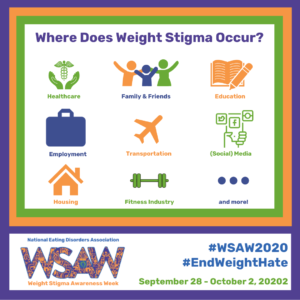This week is weight stigma awareness week. And it felt like a good opportunity to write a little recap about what is weight stigma and why it matters, to ALL of us, regardless of our body size.
NB: I don’t refer to “obesity” or “overweight” in this post, unless quoting someone else. I prefer the terms “in a larger body” or “higher body weight individual”. If I use the word “fat”, it is used as a neutral descriptor – in all my writings.
First, what is weight stigma?
According to the National Eating Disorder Association, “Weight stigma, also known as weight bias or weight-based discrimination, is discrimination or stereotyping based on a person’s weight.”
Concretely, weight stigma happens when people make ‘fat jokes’ or ‘tease’ a family member for their weight. Weight stigma is when people in larger bodies are denied access to activities, jobs or even medical care because of their size, when specific public spaces don’t accommodate people of all sizes and when we talk about ‘obesity’ like it is a disease and a matter of personal responsibility. Or when we blame fat people for ‘draining healthcare resources’ for example. The term ‘obesity’ itself (and the overpowering presence of BMI in medical practice) is in fact reinforcing weight stigma. It supposes there should be a ‘normal’ weight to attain and undermines an important fact: human bodies are infinitely diverse.
Where does weight stigma occur?
Basically, everywhere!

Victims of weight stigma report physicians and family members are the most common source of weight bias. research shows that healthcare providers, when talking to obese patients, tend to:
- Provide them with less health information
- Spend less time with them
- View them as undisciplined, annoying, and noncompliant with treatment.
Wait, is weight stigma really such a big deal?
Again, I am quoting NEDA here: “Weight stigma poses a significant threat to psychological and physical health. It has been documented as a significant risk factor for depression, body dissatisfaction, and low self-esteem.” Those who experience weight-based stigmatization also engage in more frequent binge eating (and potential weight gain) and are at an increased risk for eating disorder symptoms (including binge eating disorder)
In this paper, weight stigma is identified as a threat for public health, because it acts like a concrete barrier for people to engage in health-promoting behaviours. “Stigmatization of obese individuals threatens health, generates health disparities, and interferes with effective obesity intervention efforts. These findings highlight weight stigma as both a social justice issue and a priority for public health.” Effectively, shaming people for their weight was seen as “for their own good” for a long time, but overtime research showed that shaming people for their weight prevents people to engage in health-promoting behaviours. It prevents people to care for themselves properly by eating well, it prevents them to engage in physical activity (standard gyms are typically not welcoming of people in larger bodies), it pushes them into dangerous eating behaviours as a way to manipulate their bodies in order to try and fit the social demands placed on them, with disastrous consequences for their long term physical and mental health.
Learn more about the effects of weight stigma in this podcast with Social Psychologist and researcher Jeffrey Hunger, PhD.
I am considered ‘normal weight’, why should weight stigma matter to me?
Of course, weight stigma affects people differently depending on where they are on the weight spectrum. The larger you are, the more likely/violently you are to be affected by weight stigma.
But weight stigma is our collective responsibility. It affects us ALL because weight stigma also manifests in fat phobia, the dislike or fear of being or becoming fat.
And as weight stigma expert Virgie Tovar states perfectly: “We are all harmed by systems of inequality and hierarchy ideologies. Fatphobia creates a reality in which you are either experiencing the social stigma of being fat or you are living in perpetual fear of becoming someone who experiences the social stigma of being fat while also still gaining a sense of safety that you aren’t yet that person. It’s a total lose-lose situation.”
To better understand how people get it by weight stigma on different levels, let’s consider Virgie Tovar’s 3 levels of fatphobia:
1/ First level: intrapersonal: fatphobia affects how we see ourselves: we are never good enough and we need to use weight control to appear to ‘fix’ whatever goes wrong in our lives. This is the level where we are so ingrained in controlling our body size that we are unable to enjoy a cake slice at a birthday party for example.
2/ Second level: interpersonal: fatphobia affects how others see us. If you are living in a larger body, this is where you might face comments on your body or what you eat, coming from friends, family or even strangers.
3/ Third level: institutional. Which covers the systemic / cultural oppression people in larger bodies might face, including a sense that they are constantly judged or don’t “belong”, a chronic lack of (meaningful) representation in the media, access to quality healthcare, equal pay, etc.
Virgie Tovar adds: “Each of these levels is not a stand-alone entity. There are ways that each informs the other, and there are some parts of each that overlap with the others. For instance, access to meaningful loving relationships is both an interpersonal and an institutional level thing. The people who make up a relationship and the decisions about specific individual relationships exist in the domain of the interpersonal. Whereas the systems and cultural beliefs that go into constructing someone as worthy or interesting or smart (or unworthy, uninteresting, or less intelligent) make up the institutional piece.“
How do we reduce or annihilate weight stigma? Concretely, what can I do about it?
1/ Develop more AWARENESS. Awareness is the first step into refusing to engage in stigmatising actions and behaviours towards people living in larger bodies. We can start by acknowledging that weight stigma is all around us and speaking up when we see it happening in front of our eyes, but also considering if some of the choices we make on a daily basis might be reinforcing this stigma. Are our clothing brands, gym, restaurants, health practitioners truly size-inclusive?
2/ RECOGNIZING that people in larger bodies may have OTHER NEEDS, and supporting those being answered without making it look like an extra effort or something out of the ordinary that you’d require their extended gratitude for. This is especially true if you are a healthcare practitioner, because (as mentioned earlier) the doctor’s office is the second most stigmatising situation for people in larger bodies, directly behind family and friends. Are you providing sturdy, comfortable chairs to sit on in your waiting room? Suitable blood pressure cuffs and gowns? Are you applying the same level of care you would to a thin person, or are you constantly keeping weight loss in mind?
3/ CHALLENGING (internalised) YOUR OWN FATPHOBIA. It is crucial to question the beliefs we hold about what it means to live in a larger body. You could start by refusing to engage in ANY comments about bodies or size (yours or other people’s) or eliminate the words “obese” or “overweight” from your vocabulary. I personally find that curating your social media feed to include people of all sizes, doing all sorts of things we were taught to believe they cannot do – running marathons, modelling lingerie, having full lives and successful careers – is also a great way to “retrain” our eyes and appreciate that all bodies truly are good bodies! To support you in this, I have listed some of my favourite fat activists among my resources list here.




